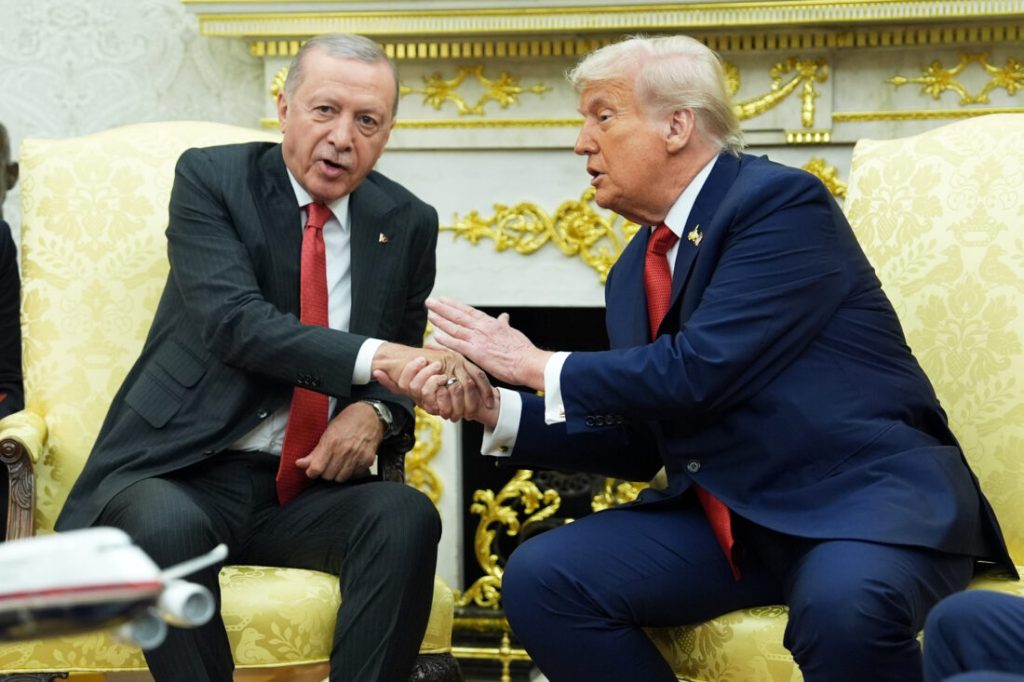President Trump Hosts Erdogan as U.S. Signals Possible Return of F-35 Sales to Turkey

President Donald Trump welcomed Turkish President Recep Tayyip Erdogan to the White House on Thursday, amid signs that the United States may soon reverse its decision to block the sale of advanced F-35 fighter jets to Turkey.
The dispute dates back to Trump’s earlier term, when Turkey, a NATO ally, was removed from the F-35 program after it acquired Russia’s S-400 air defense system. U.S. officials expressed concern that the S-400 could be used to gather intelligence on the F-35’s capabilities and that sensitive data might be transferred to Moscow.
At the start of their Oval Office meeting, Trump expressed hope that the issue could be resolved during the day’s talks.
“He needs certain things, and we need certain things, and we’re going to come to a conclusion,” Trump said. “You’ll know by the end of the day.”
This marks Erdogan’s first trip to the White House since 2019. While U.S.-Turkey relations have often faced challenges, Trump has previously described their personal relationship as a “very good one,” even as American officials have criticized Turkey’s human rights record and close ties to Russia.
Among the concerns raised was Turkey’s continued trade in Russian energy products. Since early 2023, Ankara has purchased more than $90 billion in oil, coal, and natural gas from Russia, making it one of the top buyers alongside China and India.
“The best thing he could do is not buy oil and gas from Russia,” Trump said, referring to Erdogan.
Trump also noted Erdogan’s unique position in having working relationships with both Russian President Vladimir Putin and Ukrainian President Volodymyr Zelensky.
“I think he could have a big influence if he wants to,” Trump added.
Erdogan has made clear he wants the restrictions on F-35 sales lifted and came to Washington prepared to address the matter in detail.
“I don’t think it’s very becoming of strategic partnership, and I don’t think it’s the right way to go,” Erdogan said in a recent interview.
During the previous administration, the U.S. kept some distance from Erdogan, citing democratic backsliding and his growing alignment with Moscow. Critics have accused his government of undermining democracy and restricting press freedom, while international groups have reported ongoing investigations and prosecutions targeting opposition figures, journalists, and activists.
Trump, however, sees Erdogan as a vital partner—especially in efforts to end the wars in Ukraine and Gaza. Their views on Syria have also increasingly aligned, particularly following the fall of Syrian leader Bashar al-Assad in December.
Trump credited Erdogan with playing a key role in that outcome.
“I think President Erdogan is the one responsible for Syria, for the successful fight in ridding Syria of its past leader,” Trump said.
“He doesn’t take the responsibility, but it’s actually a great achievement.”
Secretary of State Marco Rubio also met with Syria’s new president, Ahmad al-Sharaa, earlier this week during the United Nations General Assembly, signalling a broader shift in U.S. policy in the region.
Turkey is presenting itself as a stabilising force amid ongoing global tensions. Ankara believes it can act as a bridge between rival powers, maintaining relations with both Ukraine and Russia while helping shape regional responses to Syria and global trade challenges. Turkey also sees itself as a reliable actor in the Black Sea region and beyond.
Tensions with Israel remain a point of friction. Clashing interests in Syria and deep divisions over the war in Gaza have strained ties between Ankara and Tel Aviv. Trump has urged Israeli Prime Minister Benjamin Netanyahu to act with restraint in his dealings with Turkey.
Erdogan also joined a gathering hosted by Trump on the sidelines of the UN General Assembly, where leaders from eight Arab and Muslim-majority countries discussed the war in Gaza.
The Turkish leader has been sharply critical of Israel’s military actions, launched in response to the October 7, 2023 attack by Hamas that killed 1,200 people and resulted in about 250 hostages. According to Gaza’s Health Ministry, more than 65,000 Palestinians have since died, and around 90% of homes in the territory have been damaged or destroyed.
In his UN speech, Erdogan made serious accusations against Israel. He alleged that its actions amount to genocide—claims that both Israel and the United States strongly deny.
